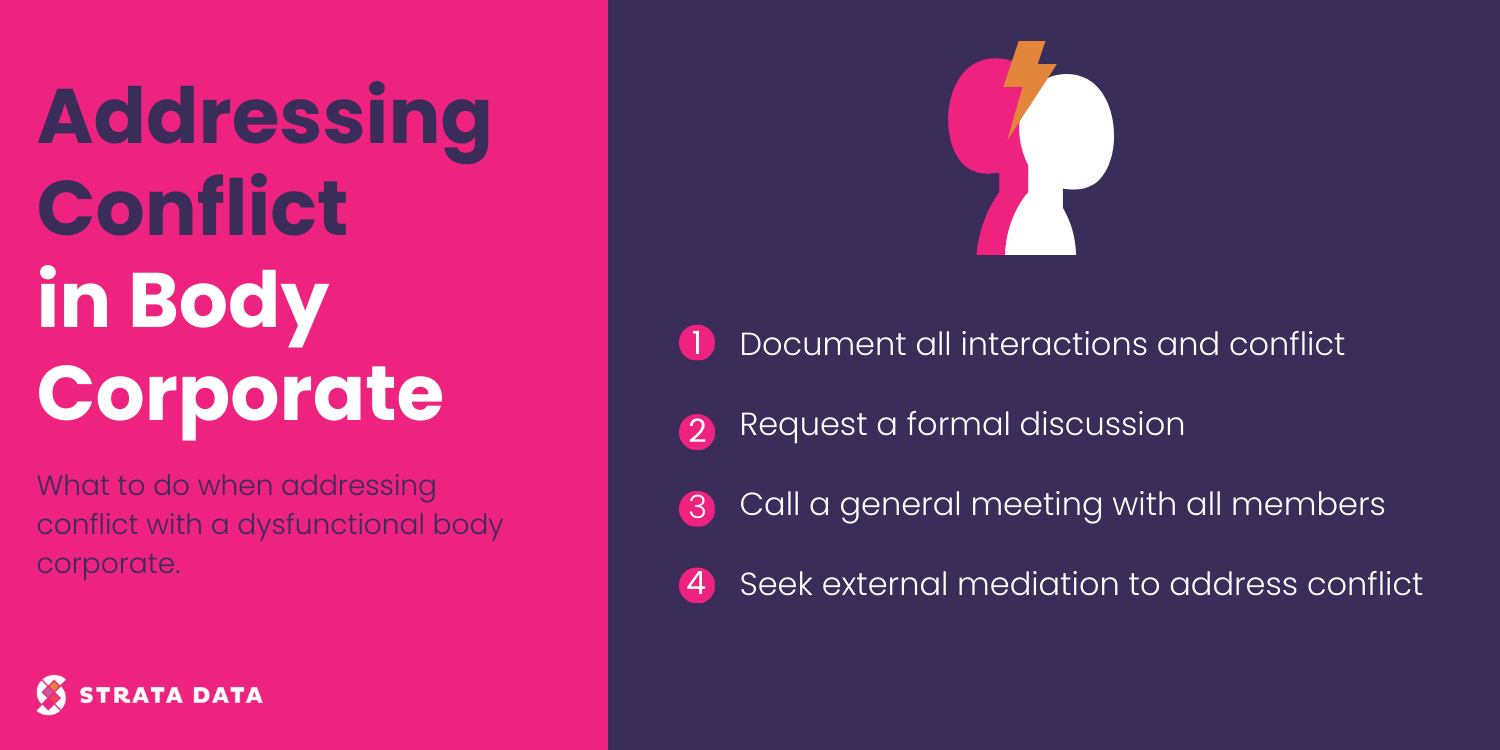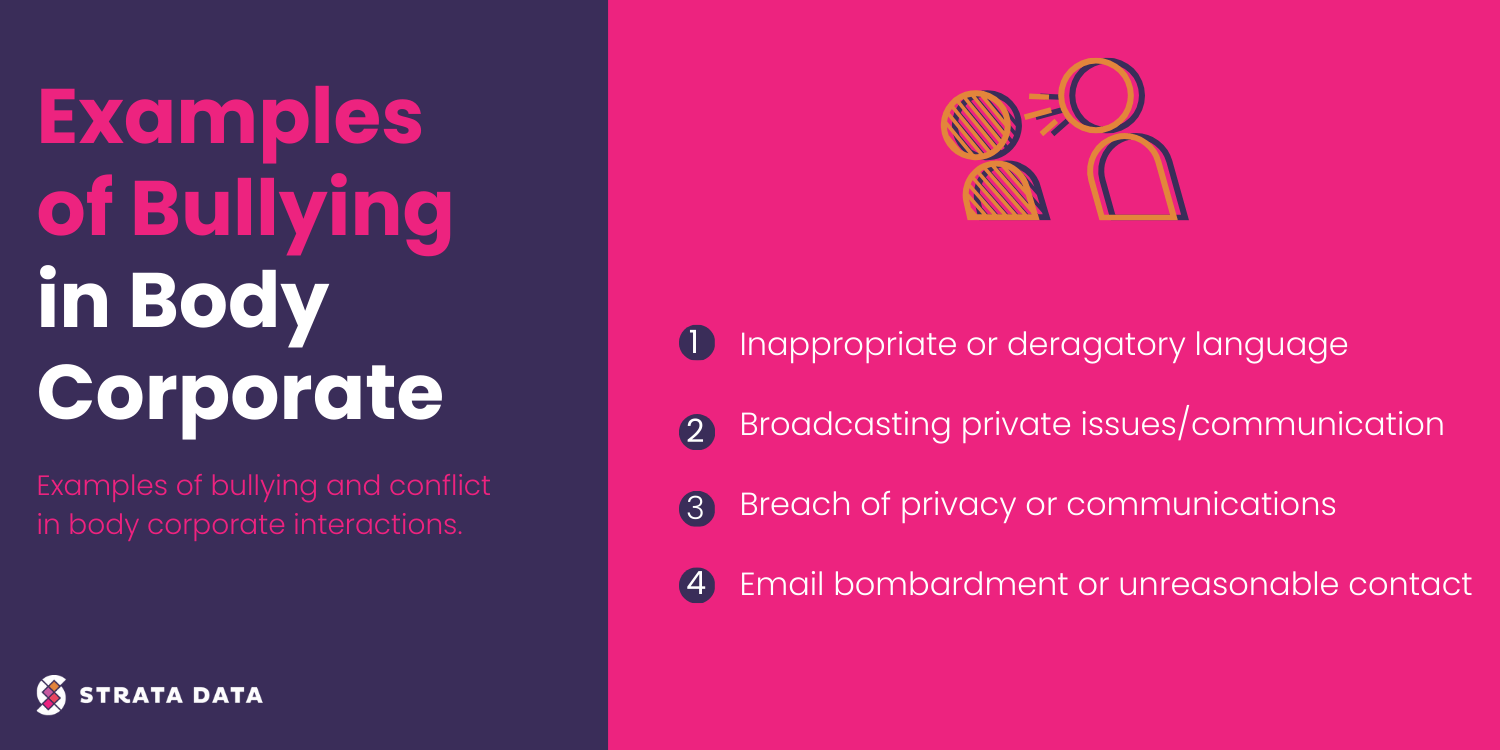Bullying in Strata: How to Address Conflict & Code of Conduct

The shared living environment of strata properties can bring conflict in how owners, tenants, and strata committee members view and address shared amenities, problems, and solutions. In a well-managed strata community, decisions are made through discussion and cooperation.
In some cases, the different expectations, personalities and priorities of strata members can lead to unfair treatment of others and bullying.
The Incidence of Bullying in Strata
Strata bullying is a real issue faced by strata communities in South Australia and across Australia. Bullying in a Strata is when conflict that occurs in the decision-making environment of a strata community results in unfair or unreasonable treatment. This affects how decisions are made, how information is shared, and the health of the strata community.
Unlike the conventional perspective of bullying, strata bullying does not always appear as a direct confrontation. Email communication, voting behaviour, and group decisions that pressure or exclude someone can often be subtle, leaving the subject both confused and frustrated.
Examples of strata bullying include:
- The use of inappropriate or derogatory language in communication
- Publication of private issues to the rest of the community
- An unreasonable level of communication such as email bombardment
Strata bullying sets an unhealthy precedent for owners and residents – it may discourage participation and make owners reluctant to take on committee roles. In the long term, strata bullying can undermine the effective running of the property and causes more distrust within the strata scheme.
How to Recognise If You Are Being Treated Unfairly
Not every decision made by the strata that feels unfair equates to bullying. There is a clear difference between disagreements and unfair treatment – it’s important to first understand the rules that govern strata behaviour.
Know Your Strata By-Laws
Every strata corporation in South Australia is required to comply with the Strata Titles Act 1988 (SA) or the Community Titles Act 1996, which outlines the roles and responsibilities of owners, tenants, and the strata committee. Additionally, each community title will have specific by-laws that govern how strata decisions are made.
Strata by-laws are legally binding, and actions or decisions that are taken in violation of by-laws can be challenged by strata members. If you are being excluded, ignored, or treated differently from others without a clear reason, review the strata’s by-laws to check whether the decision has been made in line with the rules.
Understand the Code of Conduct
South Australian legislation does not require a formal code of conduct for strata. However, some strata management services develop and implement one to ensure fair treatment for all owners and residents. A Strata Code of Conduct sets out the expected behaviour of members based on fairness, respect, cooperation, and transparency.
Review the strata Code of Conduct to help determine if you have been treated unfairly. Code of Conduct breaches may be grounds for action to be taken, even if no by-law was contravened in the process.
Addressing Conflict with a Dysfunctional Body Corporate
Document Everything
Keep a written or digital record of any behaviour or actions that you believe are unreasonable or unfair. This includes emails, letters, meeting minutes, and any formal communication.
For face-to-face conversations, keep notes on the date, time, and the people involved. Maintaining a clear record of the communications and actions surrounding the issue will provide more context for formal discussions and serve as evidence if further legal action becomes necessary.
Request a Formal Discussion
Consider contacting the strata committee or strata manager to request a formal discussion at the next meeting. Owners can request to have the issue included as a general item for discussion before a scheduled meeting, or raise it as a motion during a meeting.
Keep the request professional by avoiding any accusations, and reference any relevant by-laws or standards of conduct. Raising the issues through this channel shows that you are acting in good faith and allows the strata committee to address the problem before it escalates.
Call a General Meeting
Typically, general meetings for strata owners are held annually. However, strata lot owners and committee members have the right to call a general meeting under the Strata Titles Act 1988 (SA). At least 20% of the owners or two members of the strata management committee must agree and make a written request to call a general meeting. A 14-day notice period is required before the general meeting.
During the general meeting, owners have a chance to vote on important matters. Calling a general meeting to address strata bullying can be an effective solution to hold offending members accountable.
External Mediation
When internal attempts fail to address strata bullying, external legal support remains an option. Mediation services delivered by an independent chairperson can help owners reach a solution.
If mediation is unsuccessful or not appropriate, owners can appeal to the South Australian Magistrates Court. This court has the authority to resolve disputes under the Strata Titles Act and issue orders about owner and resident conduct, meeting procedures, or decision-making processes. This process can be legally intensive and may require owners to seek legal counsel.

Strata bullying can sometimes be a by-product of a poorly-managed strata community. Strata Data provides comprehensive body corporate management services for strata titles across South Australia to minimise such conflicts and support all owners to be treated fairly. With over 40 years of experience in the industry, we can help your strata community resolve issues amicably – get in touch with our team today to learn more about how we can help.




